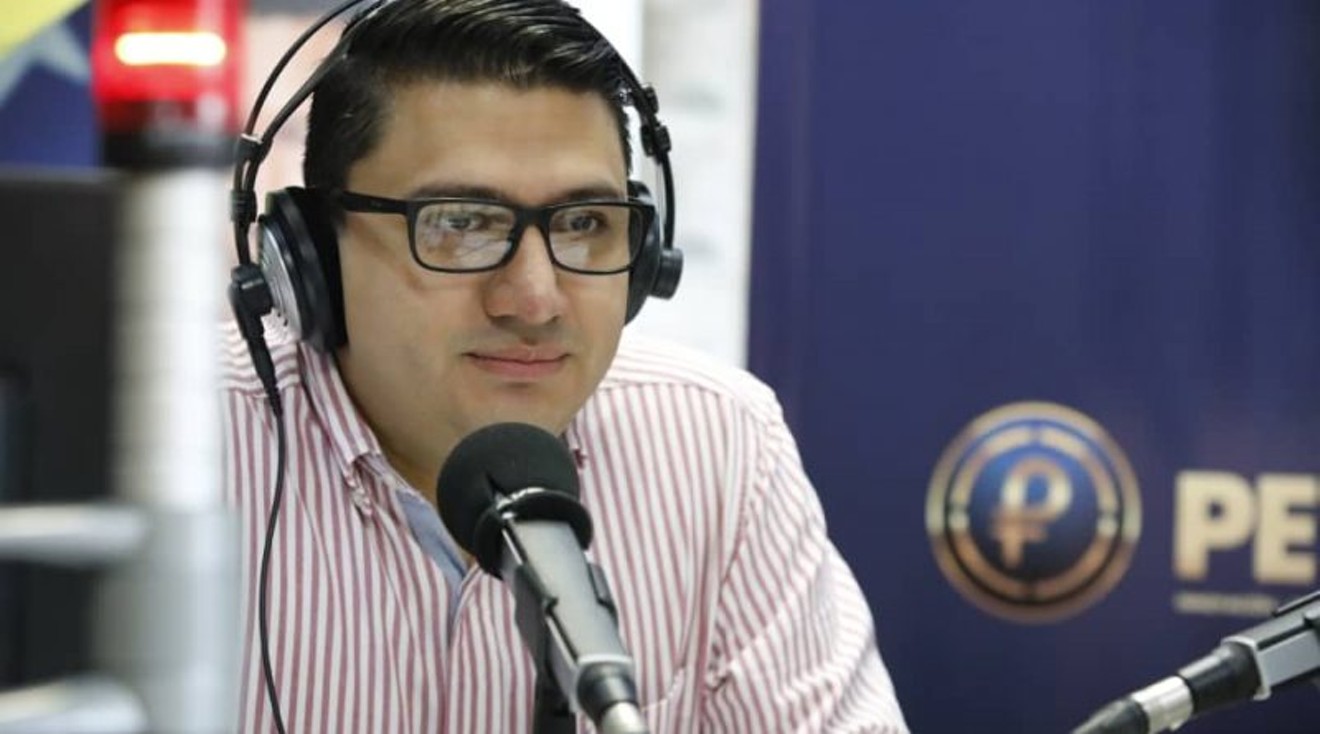But now, the government is urging Venezuelans working in other countries to begin sending money home through the nation's controversial cryptocurrency, the Petro. Calling it a safe way to protect remittances from the claws of hyperinflation, Joselit Ramírez — the head of the government agency that oversees the Petro — took to national radio this past Monday to hawk Venezuela's remittance platform, Patria Remesa en Criptoactivos.
"It's the simplest, easiest, and safest way to send money," Ramírez said on his program, Venezuela Cripto, which is transmitted by a government radio station. "And it's the only way to avoid depreciation of income."
But some Venezuelans living abroad say it's nothing more than a ploy.
"We know that this is simply an attempt to take advantage of remittances. We know that this is a tool to dodge sanctions," says José Colina, president of Miami's Veppex (an acronym for Politically Persecuted Venezuelans in Exile, in Spanish). "It goes without saying that the claim that this is the safest way to avoid depreciation of income is absurd."
Maduro has done everything possible to push adoption of the cryptocurrency since its creation last year as a means to skirt international sanctions. The Venezuelan government tried tethering the Petro's value to the country's inflation-ravaged fiat currency, the bolívar, last year and more recently offered free Petro tokens to students and other youths participating in a government work program. This week's plea to funnel remittance funds toward Petro tokens is the latest signal boost for the digital currency and strikes many Venezuelans abroad as a sales pitch for a familiar kind of snake oil.
In 2017, remittances to Venezuela were worth an estimated $1.5 billion, according to the Caracas-based research firm Ecoanalitica. That figure is expected to rise to $4 billion this year. That doesn't include an expected $1.5 billion in withdrawals by Venezuelans from foreign bank accounts, according to a report by Bloomberg News. Add that in, and remittances could overtake oil sales as the largest source of income in Venezuela, which is home to the world's largest proven oil reserves.#Noticia || El superintendente Nacional de Criptoactivos, @JoselitRamirez, destacó que Patria Remesa en Criptoactivos, plataforma para el envío de dinero desde el exterior al país mediante el Sistema Patria, está en pleno funcionamiento. https://t.co/RrkSYgjRhj pic.twitter.com/GCtgXIeWxh
— Vicepresidencia Vzla (@ViceVenezuela) August 27, 2019
Unfortunately, those remittances are not only a godsend for hungry and sick Venezuelans, but also a lifeline for Maduro's regime. Maduro and his acolytes have clung to power thanks to a cocktail of rackets, such as illegal gold mining and drug trafficking, combined with spending cuts on food imports and skimming money off the top of aid sent home from Venezuelans abroad. Rent-seeking by the Maduro regime ranges from the elaborate — attempts to tax wire and cryptocurrency transfers — to simple acts such as demanding bribes or charging hefty tariffs on food and medicine packages entering the country.
The Venezuelan government has also attempted to crack down on peer-to-peer cryptocurrency exchanges that don't trade the Petro or refuse to share user data, but to middling effect. Hundreds of thousands of Venezuelans continue to send money in and out of the country in the form of better-known cryptocurrencies such as Bitcoin and Litecoin, and without government interference. In effect, the recent attempts to popularize the Petro and the state-run remittance platform seem to be little more than Maduro trying to get a bigger cut of remittances.
"First, the government generates a crisis in Venezuela, and then it looks to profit from the suffering of Venezuelans desperate for money from family abroad," Colina says. "I think it's shameless."
Venezuela's state-run cryptocurrency remittance platform was launched in March. Transactions through the platform, which accepts the Petro, along with other cryptocurrencies, carry a minimum commission fee equivalent to about 30 cents in U.S. currency, although they can run as high as 15 percent of the total amount in bolívares. The Venezuelan government claims the Petro is backed by reserves containing billions of barrels of oil but has no proof those reserves exist, never mind if it has the resources to tap them.












